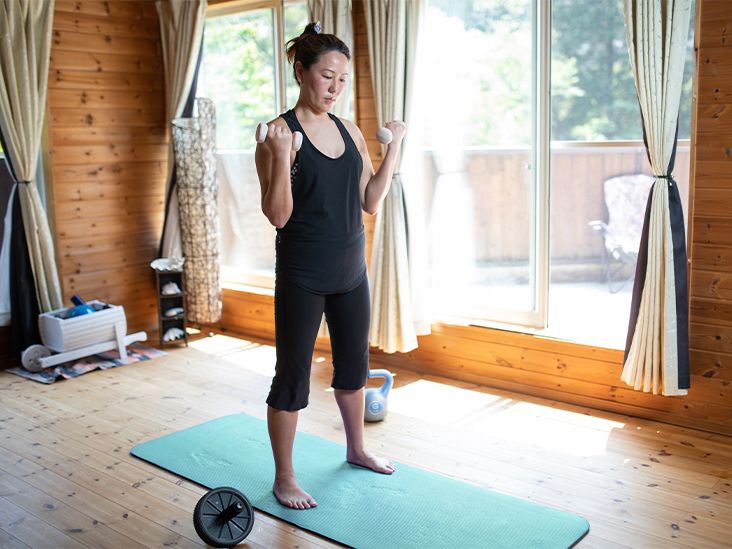1. Prevents disease
In an observational
In a 2020 study of 44,000 adults, researchers found that those who got 11 minutes of moderate-to-vigorous physical activity each day had a lower risk of death compared to those who only exercised at that intensity for 2 minutes.
This comparison held true even if people sat for 8.5 hours every day.
2. Saves money
You should always see your primary care physician for an annual physical exam.
Even if you think you do not need to see a doctor, some health conditions can be “silent.” This means they do not present with any symptoms.
Seeing a doctor regularly increases your chances of catching it early, which can lead to improved outcomes.
The healthier you are, the less often you will have to see a doctor. This could save money by reducing:
- co-pays
- prescriptions
- other treatments
3. Lengthens lifespan
Basic healthy habits are connected with living a longer life.
- never smoked
- maintain a healthy weight
- are regularly active (over 30 minutes per day of moderate or vigorous activities)
- follow a healthy diet
- keep alcohol to a moderate consumption (5 to 15 g per day for women and 5 to 30 g per day for men)
Making even a few of these changes may lengthen your lifespan.
4. It can be good for the environment
Ultra-processed foods are those that contain refined grains and additives to change the texture, taste, or color. More than 70 percent of foods in U.S. supermarkets are ultra-processed.
The making of ultra-processed foods contributes to:
- greenhouse gas emissions
- water scarcity
- decreased biodiversity
- plastic waste
- deforestation
Replacing short car rides with biking can also cut back on the amount of carbon dioxide released into the atmosphere.
Your journey toward a healthier lifestyle starts with small changes that you feel confident you can achieve. Consider making “SMART” goals. SMART stands for:
- specific
- measurable
- attainable
- relevant
- time-bound (met by a deadline and done in a certain amount of time)
By focusing on SMART goals, you may find more success. And one initial “win” will propel you to set new, bigger goals.
Consider the following tips for beginning to improve your overall health.
1. Eat more vegetables
A 2020 review of studies suggests consuming an adequate amount of fruit and vegetables is associated with lower risk of:
- heart disease
- stroke
- cancer
- premature death
You don’t have to go from eating minimal produce to having nine servings a day. You can start slow by eating one serving of vegetables at dinner. If you already do that, consider eating one vegetable or fruit at every meal.
2. Swap in whole grains
Research from
Start small by replacing one refined grain each day with a whole grain. For example, if you normally have cereal for breakfast, you may replace it with oatmeal.
- plain oats
- whole grain bread and pasta
- brown and wild rice
- buckwheat
- bulgur wheat
- millet
- barley
- spelt
- quinoa
- farro
- white bread and pasta
- white rice
- most breakfast cereals
- chips
- pretzel
- crackers
3. Be more active
When it comes to exercise, it is important to choose an activity you enjoy. This will increase the chances that you’ll stick with it.
Some types of exercise you may enjoy can include:
You don’t have to start with a long workout. Aim for 10 minutes a day, 5 days a week. When you feel ready, you can add more time.
The
4. Maintain friendships
Strong relationships and staying in communication with friends and loved ones can support mental health.
Even if you cannot get together with friends or family in person, schedule a time to catch up over a phone or video call once a week.
5. Control stress
Exercise can help reduce stress by releasing pent-up energy and boosting the release of mood-lifting hormones called endorphins.
Other mindfulness practices include:
If you would like more support relieving stress, you may consider therapy.
Working with a trained psychologist, psychiatrist, or therapist can help you work through challenges life throws your way, and it can help you learn new skills to manage stress.
It is perfectly possible to balance healthy living with eating ice cream, taking a day off from your workout, or having wine with dinner.
An all-or-nothing mindset where you can only eat “good” foods and never eat “bad” ones often backfires. Having the flexibility to eat that bowl of ice cream — and savor every bite — can be part of being healthy, too.
Rest days are also important for physical and mental health. Doing too much exercise can increase the risk of injuries, and it may cause you to burn out and give up exercise altogether.
A healthy lifestyle can not only help you feel better, but it can also reduce the risk of some diseases, lengthen your lifespan, save you money, and benefit the environment.
Start small when you make changes. You’re more likely to see success this way, and small successes will snowball into bigger benefits.
If you want help with making any lifestyle changes, talk to your doctor. If they can’t directly help you, they may recommend other professionals, like registered dietitians or therapists.
Brittany Risher is a writer, editor, and digital strategist specializing in health and lifestyle content. She’s written for publications including Elemental, Men’s Health, Women’s Health, and Yoga Journal.


